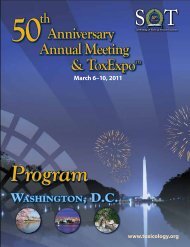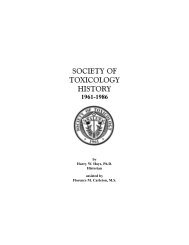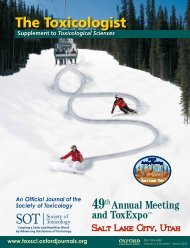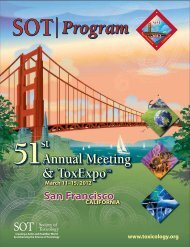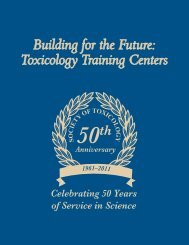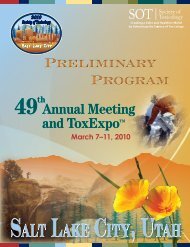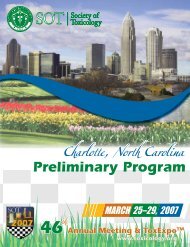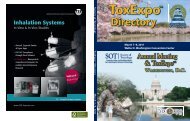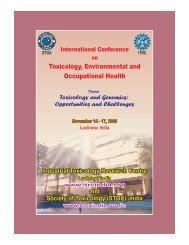51st Annual Meeting & ToxExpo - Society of Toxicology
51st Annual Meeting & ToxExpo - Society of Toxicology
51st Annual Meeting & ToxExpo - Society of Toxicology
Create successful ePaper yourself
Turn your PDF publications into a flip-book with our unique Google optimized e-Paper software.
<strong>Society</strong> <strong>of</strong> <strong>Toxicology</strong> 2012<br />
Scientific<br />
Education-Career Development Sessions<br />
The Thematic Track information can be found on pages 8–9.<br />
Tuesday<br />
Career Alternatives and Transitions:<br />
New Challenges and Opportunities<br />
in Today’s Job Market for Toxicologists<br />
Tuesday, March 13, 1:30 PM to 4:15 PM<br />
Chairperson(s): Richard D. Storer, Merck Research Laboratories,<br />
West Point, PA, and James A. Popp, Stratoxon LLC, Lancaster, PA.<br />
Sponsor:<br />
Career Resource and Development Committee<br />
Endorsed by:<br />
Education Committee<br />
Postdoctoral Assembly<br />
New toxicology graduates have traditionally pursued a diverse spectrum<br />
<strong>of</strong> career opportunities in teaching and research, in industrial<br />
or contract toxicology laboratories, or in regulatory agencies and<br />
affiliated institutes. Downturns in the global economy, together with<br />
a wave <strong>of</strong> consolidation and downsizing in industry, particularly in<br />
the pharmaceutical sector, has created a challenging environment for<br />
job seekers. This has compelled new graduates, as well as toxicologists<br />
at all phases <strong>of</strong> their careers, to confront new challenges in securing<br />
initial or continuing employment in their area <strong>of</strong> specialization,<br />
consistent with their career goals. This session will explore alternatives<br />
available to new graduates as well as to established toxicologists<br />
facing career transitions. To begin this important dialogue targeted<br />
to new graduates, postdocs, and nontenured faculty, we will examine<br />
the challenges facing toxicologists pursuing career paths in research<br />
and teaching and will touch on alternative career paths for which the<br />
skills developed in completing a doctorate and postdoctoral research<br />
in toxicology are transferable. Our panel will review the options<br />
and challenges facing the mid- to late-career industry toxicologist<br />
confronted with the prospect or actuality <strong>of</strong> lay<strong>of</strong>fs or early retirement<br />
due to corporate downsizing. The focus <strong>of</strong> the talk will be on<br />
the current landscape for toxicology consultants either as independent<br />
consultants, employees <strong>of</strong> established consulting companies, or<br />
individuals pooling resources to form new consulting groups. If you<br />
are considering transitioning your career in a regulatory agency, a<br />
review <strong>of</strong> the opportunities and challenges for toxicologists will be<br />
provided. The final talk will provide insight on the impact <strong>of</strong> cutbacks<br />
in the pharmaceutical industry and trends favoring outsourcing <strong>of</strong><br />
toxicology testing on career development opportunities in contract<br />
research. At the conclusion <strong>of</strong> the talks, a significant amount <strong>of</strong> time<br />
has been set aside by the panelists to allow time for questions from<br />
participants.<br />
• Current Challenges in Pursuit <strong>of</strong> Careers in Academia.<br />
Barbara Kaplan, Michigan State University, East Lansing, MI.<br />
• Career Transition to <strong>Toxicology</strong> Consulting. James A. Popp,<br />
Stratoxon LLC, Lancaster, PA.<br />
• Career Transitions from Industry to Government. Hanan<br />
Ghantous, US FDA, Silver Spring, MD.<br />
• Challenges Facing Toxicologists in Today’s Job Market:<br />
The CRO Environment. Stephen Durham, Charles River<br />
Laboratories, Reno, NV.<br />
The Art <strong>of</strong> Negotiation: A Fundamental Skill for<br />
Scientists<br />
Tuesday, March 13, 4:30 PM to 5:50 PM<br />
Chairperson(s): Larissa M. Williams, Woods Hole Oceanographic<br />
Institution, Woods Hole, MA, and Ebany J. Martinez-Finley,<br />
Vanderbilt School <strong>of</strong> Medicine, Nashville, TN.<br />
Sponsor:<br />
Postdoctoral Assembly<br />
Endorsed by:<br />
Career Resource and Development Committee<br />
Graduate Student Leadership Committee<br />
Hispanic Organization <strong>of</strong> Toxicologists Special Interest Group<br />
Women in <strong>Toxicology</strong> Special Interest Group<br />
Negotiation is an essential skill for scientists <strong>of</strong> every rank and job<br />
sector to navigate their career successfully, yet it is <strong>of</strong>ten not part <strong>of</strong><br />
a scientist’s formal training. Fundamentally, negotiation culminates<br />
in the attainment <strong>of</strong> a mutually acceptable agreement between two<br />
or more parties—however there is an art to reaching such an agreement.<br />
Because negotiations typically occur behind closed doors, few<br />
will ever experience a negotiation until they represent one <strong>of</strong> the<br />
parties involved. In an ever-changing world it has become imperative<br />
to understand the nuances <strong>of</strong> negotiation, and this session <strong>of</strong>fers<br />
attendees a unique opportunity to bring negotiations out in the<br />
open. This session will introduce scientists to the intricacies <strong>of</strong> negotiations<br />
in the workplace and to discuss idiosyncrasies in negotiation<br />
tactics across toxicology sectors. The session will be delivered in<br />
two segments: a formal lecture and a panel discussion delivered by<br />
speakers from academia, industry, and government. Our panel will<br />
deliver important information on the art <strong>of</strong> negotiation, addressing<br />
conflict styles and the basics <strong>of</strong> interest-based negotiation. The panel<br />
will then discuss their personal experiences in negotiation throughout<br />
their careers and address best practices in negotiation as it relates to<br />
their sector <strong>of</strong> toxicology. Topics covered will include preparation for<br />
negotiating, how to initiate negotiation, importance <strong>of</strong> body language,<br />
gender differences in negotiation, negotiating for salary and start-up<br />
in academia, negotiating for labor and represented management at<br />
the bargaining table in government, and negotiation practices in the<br />
pharmaceutical industry. At the end <strong>of</strong> the session, participants will<br />
come away with a better understanding <strong>of</strong> how negotiations work and<br />
how to use them to their advantage.<br />
• Negotiation: Getting What You Want without Giving In.<br />
Ellen Kandell, Alternative Resolutions, LLC, Silver Spring, MD.<br />
Thematic Session<br />
108<br />
SOT’s 51 st <strong>Annual</strong> <strong>Meeting</strong>



